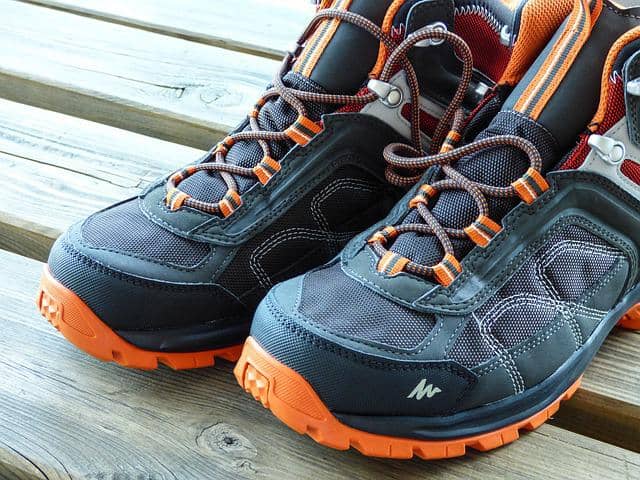Table of Contents
Some links on posts are affiliate links and will earn us a commission from qualifying purchases
Have you ever gone hiking and been really frustrated because your boots are so heavy? Well, you’re not alone. A lot of people don’t realize how much their walking boots weigh until they start carrying them around all day. In this blog post, we’ll talk about the weight of different walking boots, so you can make an informed decision before you buy a pair. We’ll also discuss why weight matters and how to find the right balance between weight and comfort. So, if you’re curious about how much your next pair of hiking boots will weigh, read on!
How much do walking boots weigh? This can vary based on the make and model of the boot, but most fall within the range of less than 500 grams to over 1500 grams. So before you buy a pair, be sure to research the weight of the boots you’re interested in to find the best fit for you and your walking habits.
How to choose the right weight of walking boots for you
When looking for a new pair of walking boots, it’s important to find the right weight for you. Heavier boots can be more comfortable and provide more support, but they can also be more difficult to walk in for long periods of time. Lighter boots are less supportive and may not be as comfortable, but they are easier to wear for extended periods of time.
Consider the type of terrain you’ll be walking on. Heavier boots are better for difficult terrain, but they may be too bulky for everyday use. If you’re only going to be using your boots occasionally, then it’s better to go for a lighter option.
So, how do you choose the right weight of walking boots for you? The best way to find out is to try on a few different pairs and see which ones feel the most comfortable. Heavier boots tend to be better for people who have bad knees or who need more support, while lighter boots are a good option for people who are looking for a more comfortable option.
Ultimately, it’s important to find a balance between weight and comfort. Boots that are too heavy will be cumbersome to wear and can cause pain in your feet and joints, while boots that are too light may not be durable enough for your needs. By considering these factors, you should be able to find the right weight of boots for your specific needs.
The benefits of wearing lightweight walking boots
There are many benefits to wearing lightweight walking boots. For one, they’re less fatiguing to wear over long distances. They’re also less likely to cause blisters or sore feet, which can be a big problem with heavier boots. Additionally, lightweight walking boots are often cheaper than their heavier counterparts, and since they’re easier to transport, they’re ideal for hikers who like to travel light.
Ultimately, the decision about whether to buy heavy or lightweight walking boots comes down to personal preference. Heavier boots offer more stability and protection, but at the cost of extra weight and reduced comfort. Lightweight walking boots are less durable but much more comfortable, making them a good choice for hikers who plan on covering long distances.
What makes up the most weight of a pair of hiking boots?
Hiking boots are often heavy because they have thick rubber soles. The main ingredient that makes these type of shoes so durable, it’s usually this tough material which absorbs shock and maintains traction on tricky terrain – making your feet feel less tired as you ascend higher into the mountains!
Boot weight is also affected by the materials used in construction. Boots made with lighter materials like synthetic materials or nylon will weigh less than those made with heavier materials like leather.
A comparison of different brands and weights of walking boots
I’ve taken a look at the weight of 18 walking boots, as detailed below. These are all relatively new – either first produced in 2021 or 2022. As you can see, there’s a vast difference in the weight of walking boots. To look at each boot click the image or name and you can see more details and reviews on Amazon.
Name
Name
Outer Material
Weight
How to care for your walking boots so they last longer
How to care for your walking boots so they last longer:
- Clean your boots regularly with a damp cloth to remove any dirt or mud.
- Let them air dry away from direct heat or sunlight.
- Apply a waterproofing agent to the leather every few months (or as needed).
- Store them in a cool, dry place when not in use.
- Stuff your boots with newspaper or other stuffing material to help them keep their shape when you’re not using them.
Conclusion – How much do walking boots weigh
So, how do you choose the right weight of walking boots for you? It’s important to think about what type of terrain you’ll be walking on, and your own personal preferences. If you like a really snug fit, go for a lightweight pair of hiking boots; if you don’t mind a bit more weight, then there are plenty of mid-weight options available.
Finally, when it comes to taking care of your new walking boots, remember to protect them from the elements by waterproofing them before use and regularly cleaning and treating the leather with a good quality shoe polish or wax.
Now that you know all about choosing the right weight of walking boots for your needs, why not check out some of our favourite picks online? We’ve looked at everything from super light trail shoes to durable full-grain leather hikers – so there’s something for everyone.
Recent Posts
The summer of 2025 is turning into a great summer, with some really hot days. Which is lovely if you are sitting by a pool or on the beach, but what happens if you are out putting in the miles...
Walking in woods and forests can be magical, and has such a great calming influence on your welfare.



















